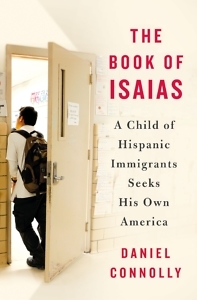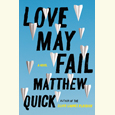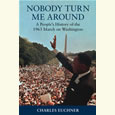Papers, Please
Daniel Connolly looks at challenges facing the children of immigrants
Memphis Commercial Appeal reporter Daniel Connolly took his first Spanish class while studying abroad in Germany, but the idea of learning the language first came to him when Spanish-speaking immigrants began to attend his church in Memphis’s Hickory Hill neighborhood. Connolly went on to work as a reporter for the Associated Press in Arkansas, and Latino immigration was one of his beats. After returning to Memphis to write for his hometown newspaper, he decided to write a book about the challenges facing children of immigrants.

Connolly spent the 2012-2013 school year at Kingsbury High School, where Latino teenagers make up nearly fifty percent of the student population. (Other students are the children of immigrants from places as diverse as Cambodia and Iraqi Kurdistan.) While The Book of Isaias takes its title from the name of one student at the school, Isaias Ramos, Connolly’s focus includes the changing face of the Berclair neighborhood in Memphis and the students, teachers, and administrators who strive to make the American Dream as inclusive as possible.
Connolly recently spoke with Chapter 16 in the studio of WYPL in Memphis. What follows is a text excerpt from that interview. Download the podcast or stream it online here.
Chapter 16: Did you know Isaias Ramos before you got the idea to write a book about the challenges of an undocumented teenager who wants to go to college?
Daniel Connolly: No, I actually met him when I was well into the project. In 2010, I had a conversation with Mauricio Calvo, the head of Latino Memphis, and he told me that he was concerned with immigrants’ kids. So I decided to pursue a book project about the lives of immigrants’ children growing up in Memphis. I then got permission to work as an embedded reporter in Kingsbury High School. On the first day, a woman who worked for Streets Ministries, Margot Aleman, told me that there was an interesting student I should meet named Isaiah. I met him the next day. He was a really interesting kid, and one of the first things he did was correct me: “My name is Isaias, not Isaiah,” and I ended up naming the book after him.
Chapter 16: Isaias’s parents, Mario and Cristina, entered the United States illegally with Isaias and his older brother Dennis, but you write about how they really didn’t understand the ramifications of entering the country that way.
Connolly: Isaias’s father, Mario, told me that in Mexico you really have no idea about American immigration law. You just see people coming and going all the time, and nothing happens. To a lot of people, that might seem really strange, but there are a couple of things at work. In Mexico, generally, the rule of law is not very strong. There’s a lot of corruption. What the law means depends on who you know. The other element of it is that the United States frequently didn’t take its own immigration laws that seriously. For many years we have had a system that more or less allows people to live here with limited rights, though this has been changing and evolving over the years.
Chapter 16: Isaias also wanted to be a singer-songwriter. Often for kids it can be tough enough to decide whether to go to college or pursue a more creative line of work. How much do you think Isaias’s ambivalence was the result of the legal hoops and red tape he would have to jump through in order to get a college education and how much was that truly he just wasn’t sure if college was the path he wanted to take?
Connolly: When I spoke with Isaias about this, he offered different thoughts at different times. Ultimately what ends up being decisive in his story are his family’s circumstances and his family relationships.
Chapter 16: But there were a lot of people at Kingsbury High and within local community organizations who wanted to help Isaias achieve a college education, but he could be somewhat passive. And that seemed to be characteristic of a lot of students. There were programs to help students in town, and they just wouldn’t show up to the meetings, which could help them get free money for college.
 Connolly: I was kind of surprised when I spent time in the high school because when we think about neighborhoods with a high poverty rate, we think about lack of opportunity. In some sense there is a lack of opportunity, but also in some cases there is a lack of willingness by the student to seize the opportunities that are there. Isaias was either slow to go after them or didn’t go after them at all.
Connolly: I was kind of surprised when I spent time in the high school because when we think about neighborhoods with a high poverty rate, we think about lack of opportunity. In some sense there is a lack of opportunity, but also in some cases there is a lack of willingness by the student to seize the opportunities that are there. Isaias was either slow to go after them or didn’t go after them at all.
Now, I’m not faulting his character, but what I would say is that I believe that our society should help children of immigrants. We need to recognize that if we indeed want to do that, we need to recognize that motivation for many of them is an issue. We can’t assume that these children and teenagers want to go to college. Every adult who works with them needs to know that motivation is something they need to foster.
Chapter 16: How much internal conflict did you have in maintaining a journalistic remove but wanting to be of assistance to Isaias?
Connolly: When you are in an embedded situation as I was in Kingsbury High, you’re spending all of your time with teenagers and adults who are trying to help them. And it does become really difficult to act with complete detachment. If a teacher is moving chairs around a classroom, is it appropriate for me to help? If they ask me to give a talk about being a journalist on career day, should I do that?
There comes a point when from sheer politeness you can’t refuse all of these requests, but then you do have to draw a line somewhere. So with Isaias, frequently I wanted to give him advice, but I didn’t feel that it was appropriate. Sometimes I knew things that would have been helpful for him to know, and I didn’t tell him. That’s kind of a bad feeling, but as the years went on, after he graduated from high school, my relationship changed with him a bit. I did a newspaper article about him that got a lot of attention. After that, I sort of started giving him some advice here and there. I describe in the book where I gave him some advice but he chose to do something different, and I understand that it’s his life, not mine.
[This article appeared originally on September 27, 2016.]

Stephen Usery is the producer of Book Talk, an author-interview program that airs daily on WYPL FM 89.3, a service of the Memphis Public Library and Information Center. He lives in Memphis.





